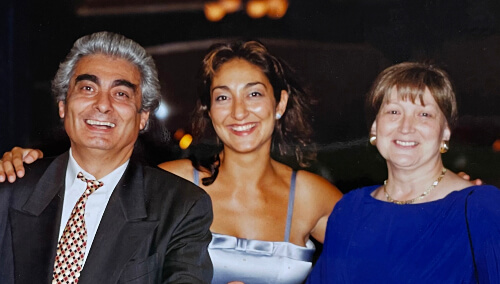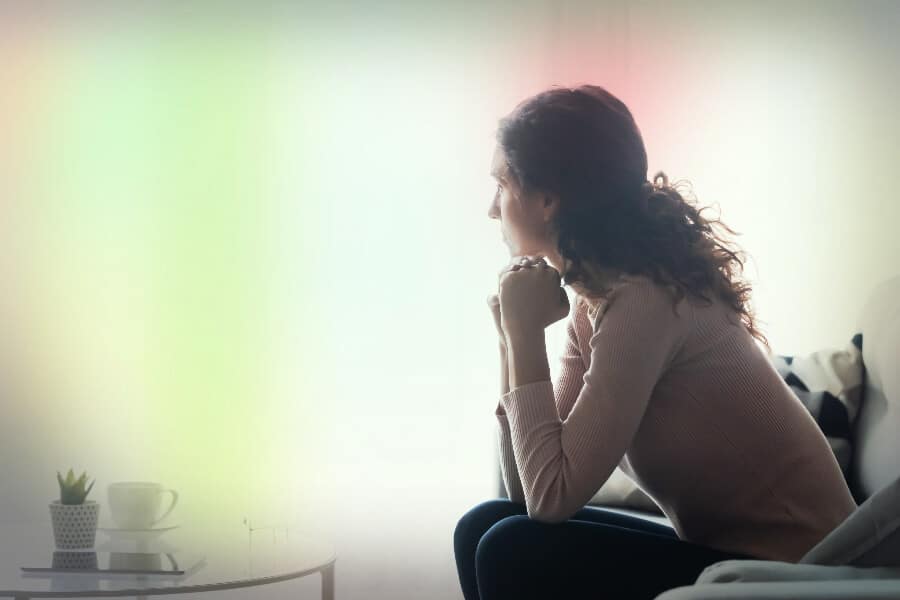Early on during the pandemic, I got to know my mother better. Which is remarkable, really, because she died of breast cancer 24 years ago, when I was on the cusp of 30.
Now I’m 53, still single with no kids of my own. But I’d never felt quite as isolated as I did during the height of the COVID-19 outbreak. I had a lot of time with my own thoughts—no surprise—but the darkness that descended was due to an old memory creeping up, a comment my friend Teresa had made to me shortly after my mother died.
“You were so mean to your mother.”
I tucked the comment far away in my mind for two decades, until it emerged again, eventually consuming me.
She didn’t specify any particular incident, and after asking her to never say that again, I tucked the comment far away in my mind for two decades, until it emerged again, eventually consuming me.
I’ve missed my mom every day, but suddenly the pain of not having her felt acute, a pain that I turned against myself for being a lousy daughter. Depressed, doubting myself, I also began doubting our relationship. Suddenly, I wondered if I had been a good enough daughter, and a wise friend—not Teresa—suggested I try writing my mother a letter, so I did.
Read More: What I Inherited From My Mother Was Not at All What I Expected
Letter to My Mother
“Dear Mom,
I am sorry I was a total cow to you sometimes…”
Objectively, I realized that all daughters are mean to their mothers once in a while. I also knew that my mother would be the first to say, “Teresa’s comment was foolish.”
Still, there were certain instances that haunted me.
“Sorry about the time when I was 15, and looking at old photos of you and dad, and I said, ‘I can’t believe you got him.’”
My father was regularly mistaken for Omar Sharif, but my mother also had an air about her, part Meryl Streep, part Princess Di. I, on the other hand, happened to be in the awkward adolescent stage, with braces, a head and neck gear (worn at the same time), and in desperate need of a nose job. I was also obsessed with a boy who barely knew I existed.
Her grace made me long to be that composed.
Somehow, my mother must have known how I was feeling because her sweet reply, “Which picture are you looking at love?” Her grace made me long to be that composed.
“That comment was all about me hating me, mom—not about you,” I write.
Then there was the time I entrusted my shoeboxes full of high school letters to a classmate and neighbor instead of letting them sit in my closet while I went off to college. I didn’t want my mother to read them, not that she would have. I can still visualize the hurt look on my mother’s face when I handed the boxes over to my friend.
“I didn’t want to worry you, mom,” I write in the letter.
Then there was the period in my early 20’s when I used to visit my boyfriend’s mother every few Sundays. I still lived at home then and I remember my mom would ask if I was going to see Mrs. Irwin, with a warm smile on her face, simply wanting to be a part of my life. I would say yes and drive off, wanting to build something of my own.
Remember when I was 10, I asked you to buy the house next door so that when I grew up I could live next to you? Gosh, I was a smart kid.
That may have been one of the nicest things I ever said to my mother, and it was prescient. In my letter, I also tell my mother that after 30 years in fashion, I opened my own design academy. I tell her I never married, and that she was right years ago when she said, “living life alone must be terribly lonely at times.” I tell her I have a dog named Noodle and that the only consolation I have in knowing that he will likely die before me is that she will be there to love him in my place. Only she will do it better. I also tell her about my nephews and niece (the grandkids she never saw), and how, childless as I am, I try to love them enough for the both of us. And then I go back to loathing myself.
As I bawl my eyes out, I write, “I deserve this lonely life because I was such a lousy daughter.”
And then it hit me, did my mother, while sick, ever wonder if she deserved her life?
Because if I’m honest, she wasn’t always the ideal daughter herself.
I’ve always blamed my father for that.
The Role Model?

The author with her parents the summer before her mother’s death.
My dad stopped talking to my mom’s side of the family (and his own sister) when I was in first grade, for reasons that remain mysterious to me. To keep the peace in her marriage, my mother stood by my father and didn’t reach out to her family for 25 years, though they lived less than ten miles away. Various relatives tried to help our families sort things out, but my parents were young and busy building a business and family. I doubt my mother ever thought that she would die too soon and might not have the opportunity to tell her family that she was sorry.
It wasn’t until my COVID letter, mired in my own pain and guilt, that I considered what she likely felt during those years.
My cousins, my mother’s niece and nephew, now tell me how my mom would sneak them kisses at community functions. Sometimes, enveloping them, she’d say, “Do you know who I am? I am your auntie.”
When her father died, we went once to visit my grandmother. My mom surely must have wanted more than this. Yet she never expressed regret about her choice to abandon her sibling and parents, at least not in front of me. It wasn’t until my COVID letter, mired in my own pain and guilt, that I considered what she likely felt during those years, the pain and guilt that came from ignoring her family at every life milestone and all the days in between. Why hadn’t she simply called her mom when she needed to talk? Maybe… she felt like a lousy daughter.
Near the end, when we could no longer deny that my mother’s cancer was winning, my father called her brother (my uncle and godfather), and said, “Your sister is sick. I don’t want to be the one to keep you from her.”
Reconnecting
Over the next eight months, the last of my mother’s life, I met our younger cousins, got reacquainted with my auntie, and, for the first time, observed my mother as the sister, the daughter, the groovy aunt. My maternal grandmother was, at 91, still alive. One night, my aunt and uncle had our family over for dinner with all the cousins and my grandmother and my beautiful mother wearing a turban head covering I’d made for her and all her chemo friends, a la 1970s Elizabeth Taylor. That night, she sat next to her mother, never leaving her side. Though she was sick herself, she fed my grandmother, wiped her mouth, and asked her every three minutes, “Do you want something, mom?”
After dinner, I took a photo of the two of them sitting on the couch holding hands, both women smiling, their eyes damp with joy. Apparently, no apologies were needed. That was the last time they saw one another. My mother didn’t want her mother to see her withering away.
My mother looked at me, gob smacked. So, I blurted out my first thought.
Shortly after that night, I moved back into my parents’ house to look after my mom and to help my dad. I went with my mother to her last chemo appointment, and was there when her oncologist (a guy with a horrible bedside manner) said, “Don’t plan on growing old with your husband, Lina.”
My mother looked at me, gob smacked. So, I blurted out my first thought: “Well, some could see the silver lining in that statement.” We cried and laughed and cried some more as I drove us home.
About a month before she died, I was in the kitchen making her pancakes when she shuffled in. She loved pancakes at the end. As I flipped, she opened the spice drawer and said, ‘In the back is where I keep the sumac your father likes this on his eggs, just so you know when I’m not here.’
My mother passed at home, with her entire family around her.
During Covid, I had the time to grieve my mother fully, uninterrupted. It was painful, but I realized that even though sometimes I had been a terrible, no good, very bad daughter, it was ok. After all, I was in good company.
Read More: If Only: How Do You Let Go of Your Dreams For A Grown Child?





















0 Comments